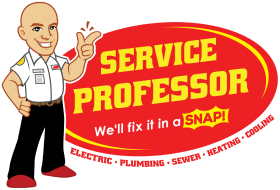Summer in West Michigan can take a toll on your plumbing system, especially with increased water usage, hot weather, and unexpected storms. As we transition to fall, it’s the perfect time to take stock of your plumbing and address any minor issues before they turn into costly problems. At Service Professor, in Grand Rapids, MI, we’re here to help you keep your home’s plumbing running smoothly all year long.
Why Late-Summer Plumbing Maintenance is Important
As summer winds down, you might not think much about your plumbing, but this is actually the perfect time to give it some attention. The constant use of water during the summer months, combined with the heat, can lead to wear and tear on pipes, drains, and appliances.
If you don’t take action now, you might end up dealing with plumbing problems right when you need your system to be at its best during the colder months. Tackling maintenance tasks in late summer helps prevent bigger, more expensive issues from cropping up when you least expect them.
Late-summer maintenance also gives you a head start on the fall and winter seasons when plumbing problems are more common. Water inside pipes can freeze during colder months, leading to busted pipes and water damage.
Inspecting and Cleaning Your Drains
One of the most common plumbing issues that can arise in late summer is clogged drains. With everything from food scraps to dirt and debris going down the drain, your system can easily become clogged. In the kitchen, grease from cooking and food particles can accumulate in the sink, while the bathroom often sees hair and soap scum that can clog your pipes. By cleaning your drains now, you can prevent slow drainage and potential backups later.
To prevent clogs, start by pouring hot water down your drains once a week. This simple habit helps break down grease and debris that may have started to build up. You can also use a drain cleaner or a mixture of vinegar and baking soda to keep things flowing smoothly. If you notice a slow drain, now is the time to address it before it becomes a more significant issue. If you’ve experienced recurring issues with specific drains, it may be worthwhile to have a professional inspect your pipes to ensure there’s no underlying problem.
Checking for Leaks
Leaks might not always be obvious, but they can waste a significant amount of water and lead to serious damage. During the late summer months, take a few minutes to inspect your faucets, toilets, and pipes for any leaks. A small drip here or there may not seem like a big deal, but it can add up over time in terms of water waste and cost. If you leak into a hidden area, such as behind a wall or under the floor, it can lead to water damage and mold growth, which can be significantly more expensive to repair.
Start by inspecting all visible pipes, particularly in areas like under the sink, around your water heater, and near your washing machine. If you notice any wet spots or pooling water, it’s a good sign that there’s a leak that needs to be repaired. Also, check your water meter for any movement when you’re not using water to see if there’s an unseen leak somewhere in your system.
Preparing Pipes for Cooler Weather
As summer gives way to fall, it’s essential to take precautions to protect your pipes from freezing. While this may not be an immediate concern in late summer, it’s a good idea to start preparing early. Freezing temperatures can cause pipes to burst, resulting in significant water damage and costly repairs. To protect your plumbing system, start by checking areas of your home that are vulnerable to freezing, such as basements, attics, and crawl spaces.
If you have any exposed pipes in these areas, insulate them with foam or pipe insulation to prevent them from freezing. You should also check for drafts and seal any gaps around windows or doors that could let in cold air. If you have outdoor faucets, be sure to drain them and cover them for winter. Taking these preventive measures now will help you avoid the stress and expense of frozen pipes in the middle of a winter storm.
Maintaining Water Heaters
During the summer months, you might not think much about your water heater, but keeping it maintained is an important part of late-summer plumbing care. Sediment and mineral buildup inside the tank can cause the water heater to run less efficiently, increasing your energy bills and decreasing the lifespan of the unit. This is especially true in areas with hard water.
To maintain your water heater, consider flushing the tank to remove any sediment that has built up. This simple step helps the heater operate more efficiently and reduces the likelihood of malfunctions. Also, check the temperature setting on the thermostat and make sure it’s set at a safe and efficient level. You don’t want it too high, as it could lead to scalding or unnecessary energy use, but you also don’t want it too low, which can cause the heater to work harder than it needs to.
Inspecting Hoses and Appliances
Late summer is a good time to check the hoses on your washing machine, dishwasher, and refrigerator. Hoses can wear out or crack over time, causing leaks and water damage. Look for signs of wear, bulging, or cracks, especially if the hoses are old. Replacing worn-out hoses now can prevent unexpected water damage in the future.
In addition to checking hoses, look over appliances that use water, like the dishwasher and washing machine, to make sure they’re functioning properly. Clean any filters or screens that may have accumulated dirt and debris. Proper maintenance can prevent clogs and keep these appliances running smoothly, helping you avoid costly repairs.
Taking Care of Your Sump Pump
In areas with heavy rain or flooding, a sump pump is necessary. It helps keep water out of your basement by pumping excess water away from the foundation. To make sure it’s working, test the pump before the rainy season. Simply pour a bucket of water into the sump pit and check that the pump turns on and drains the water properly.
If your sump pump isn’t functioning as it should, now is the time to address the issue. Check the discharge pipe to make sure it’s not blocked or clogged, and make sure the pump’s float switch is operating freely. By addressing sump pump issues in late summer, you’ll be ready for the fall rains and winter snowmelt, preventing water damage to your basement.
Scheduling Professional Inspections
Even if you’ve taken care of basic plumbing maintenance tasks on your own, there’s no substitute for a professional inspection. A plumber can identify any potential problems that you might have missed and provide solutions that you wouldn’t be able to spot yourself. Regular plumbing inspections are key to keeping your plumbing system running smoothly and avoiding unexpected issues down the line.
Schedule Your Late Summer Plumbing Inspection Today
Taking the time to address plumbing maintenance in late summer can save you a lot of time, money, and hassle in the months ahead. Simple tasks like checking for leaks, inspecting hoses, and cleaning drains can prevent bigger issues down the road. If you’re ready to take control of your home’s plumbing system, Service Professor is here to help. Book your service today and keep your home’s plumbing in top shape.

